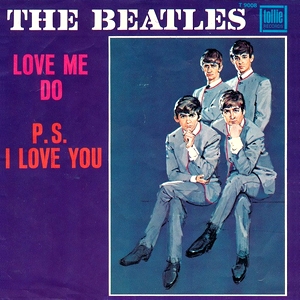The Beatles first single was 'Love, Love Me Do', released October 1962; it reached number 17.

Their second single released the following January, 'Please, Please Me', was their first number one. The Stones went for a more negative vibe for their first number one: 'It's all over now', released slightly earlier by its composer, Bobby Womack, with his band 'The Valentinos' (in the sixties there was often a US and UK version of the same song); the Stones were promoted as the edgy opposite of the Beatles, with them unsmiling in the dark moody photo on their first album, the self titled 'The Rolling Stones', and abandoning the smart suits for their casual clothes at performances.
Their name was taken from a Muddy Waters track, apparently by Jones on impulse while on the phone to 'Jazz News'. But it was a choice that suited their tearaway, dishevelled image, and suggests that they would be on top of the insects! In 2004 Rolling Stone magazine compiled a list of the top 100 artists in which the Beatles were number one, the Stones at number four. But in the sixties it was still early days and a level playing field, you chose your side depending on whether you were a rebel or not.
The Stones' first three singles were covers (the second record was a Lennon-McCartney song, 'I wanna be your man'), as were most songs on the first LP. It was their manager Andrew Loog Oldham who marketed them as 'anti-Beatles', but he was also urging them to write their own material like The Beatles, who were initiating the idea of the self-contained rock band writing their own songs . Their album, 'Please Please Me' hit the top of the album charts, usually dominated by easy listening and film soundtracks; the majority of the songs were self-penned. The distinctive cover photo brightly coloured in contrast to the shadows of the Stones' cover, is of the Beatles grinning, looking down the stairwell of the EMI London headquarters building.
Fast forward to the end of the decade - The Beatles may have been the most acclaimed and successful pop band, but when they broke up in 1969, the Stones were able to take up the slack - 'Sticky Fingers' in 1970 was a triple-platinum selling album, the first of their albums to achieve this.The individual members of the Beatles went on to have successful solo careers, as have some of the Stones in tandem with the band, but despite Jagger's earlier reservations about still being on stage in his sixties - and he's seventy next year - the band continue to tour and perform. They released a large hardback book entitled '50' last summer to commemorate half a century of the band, and a photographic exhibition was held in the summer at Somerset House.
No comments:
Post a Comment